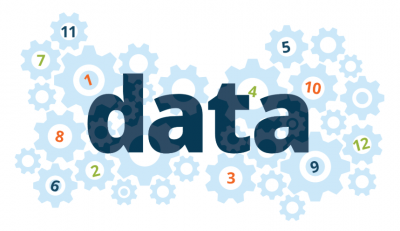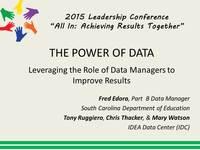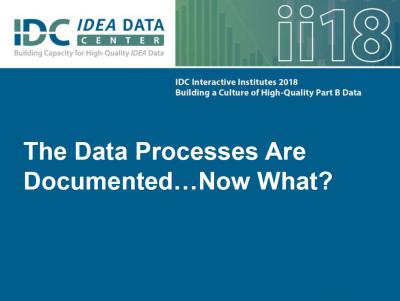Archived Resources
The Resource Library houses tools and products that were developed by IDC, developed with its collaborators, or submitted by IDC stakeholders. Search and filtering tools are available to help users navigate through the library.
Archived Resources 29 - 35 of 222
Format: Presentations
Think Like an Evaluator: Backwards, Forwards, and in CirclesThe presentation focuses on the key aspects of planning for evaluation of the SSIP. Highlighted information includes the purpose of evaluation, setting the state for evaluation, the importance of focusing on outcomes, evaluation logic, and planning. Helpful handouts are included.
Format: Online Applications
The Uses and Limits of Data: Supporting Data Quality With a Strong Data ChainThis online learning module provides a general overview of how the methods and design of data collection and analysis affect interpretation of the data. The module presents the different links in the data chain (e.g., defining the question, measurement strategy) and describes how each link contributes to quality of data and data analyses. The module also includes examples from a selection of Part B and Part C SPP/APR indicators to illustrate how each step in the data chain contributes to the integrity of the data and its interpretation
Format: Presentations
The Role of IDEA Data Managers in LA/SEA Data Governance ProgramsData governance is a critical function for organizing and exerting proper influence over data management decisions. During the last several years, many LAs and SEAs have defined and adopted data governance programs. This session explored the role of IDEA data managers as data stewards in SEA data governance programs.
Format: Presentations
The Power of Data: Leveraging the Role of Data Managers to improve ResultsThis session examined the strategic role data play in state agency decision making by exploring how data managers can more effectively use their role to promote public reporting, data awareness, data utilization, and systems change. Presenters paid particular attention to data governance, cross-department information sharing, timely data access, distribution, usability, and analysis, along with examples of best practice from practitioners in the field to ultimately improve student results.
Format: Presentations
The Interplay of Qualitative and Quantitative DataThis session provided a brief overview of various types of qualitative data collection methods. Presenters provided examples of different ways states can present qualitative data. They also discussed basic strategies for using qualitative and quantitative data together to support continuous improvement and evaluation efforts in states.
Format: Presentations
The Hard Work of Collecting Data on Quality and ComplianceThis session provided an overview of the landscape of Part B Indicator 13 data collection across the nation. Presenters shared insights from the TA Center charged with analyzing this indicator and two states that have wrestled with examining the quality of services in the compliance monitoring process. Presenters shared data, lessons learned, and suggestions.
Format: Presentations
The Data Processes Are Documented…Now What?Completing data documentation using IDC’s Part B IDEA Data Processes Toolkit provides many benefits to state agencies. After developing one or more of the protocols, state staff have seen firsthand the benefits of improved understanding of the data and communication about the data processes. This session provided a rationale for ongoing use of the data process protocols and how their use can help build capacity to create a culture of high-quality data at both the SEA and LEA levels.








